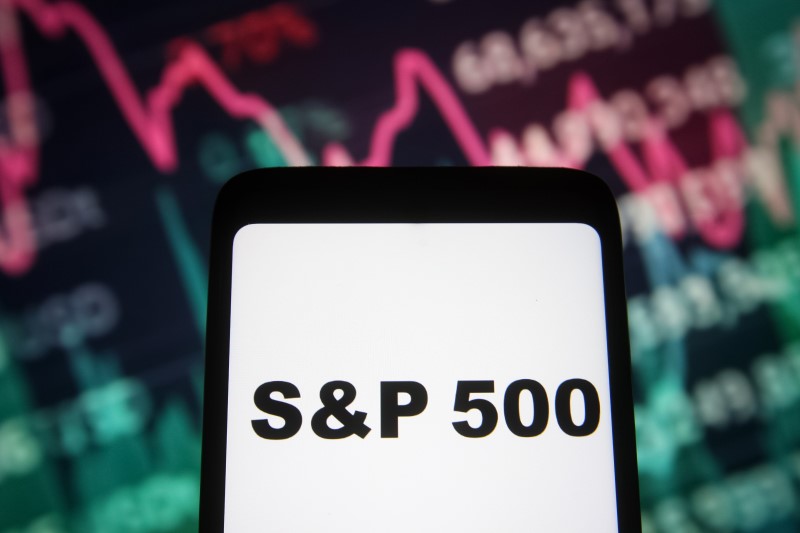© Reuters. FILE PHOTO: A Christmas tree is seen outside of the New York Stock Exchange (NYSE) in New York City, U.S., December 13, 2023. REUTERS/Brendan McDermid/File Photo
By Stephen Culp
NEW YORK (Reuters) -U.S. stocks gyrated to a mixed close on Friday as investors headed into the Christmas holiday weekend, having digested cooler-than-expected inflation data which firmed bets for Federal Reserve interest rate cuts in the new year.
All three indexes turned less decisive in light trading as the afternoon progressed, after an initial rally on data showing inflation is easing closer to the U.S. central bank’s target.
The Nasdaq joined the in positive territory, while the blue-chip Dow finished nominally lower.
“Some traders are willing to back away late on a Friday in order not to be exposed over a long weekend, and we are in a period of heightened geopolitical risks,” said Tim Ghriskey, senior portfolio strategist Ingalls & Snyder in New York. “But most traders are investors are in the market because this has been a huge rally.”
Small caps handily outperformed the broader market, with the ending up 0.8%.
All three indexes notched their eighth consecutive weekly gains, the longest weekly winning streak for the S&P 500 since late 2017.
For the Nasdaq and the Dow, it marks the longest streak of consecutive weekly gains since the beginning of 2019.
The S&P 500 is now within 1% of its record close reached in January 2022. Should it close above that level, that will confirm the benchmark index has been in a bull market since bottoming in October 2022.
“In the context of what we’ve seen on a year-to-date basis, it’s actually pretty extraordinary what we’ve seen in the fourth quarter,” said Michael Green, chief strategist at Simplify Asset Management in New York. “Small caps continue their absolute tear.”
“The Russell 2000 has gone from being down on the year as of August to now being up 15.6% for the year,” Green said. “This truly has become an ‘everything’ rally.”
A swath of data was released on the last trading day before the long weekend, notably the Commerce Department’s Personal Consumption Expenditures (PCE) report, which showed inflation continues to meander down toward the Fed’s average annual 2% target.
A separate report showed new orders for core capital goods landed well above analysts’ expectations, an upside surprise that bodes well for U.S. corporate spending plans.
Together, they reinforce the conviction that not only will the central bank begin cutting interest rates as early as March 2024, but it might pull off reining in inflation without tipping the economy into recession, a “soft landing.”
“The PCE report was very dovish. The topline number showed deflation for the month. It was very positive and perhaps a step toward lowering rates,” said Ghriskey. “Some call for that to happen in March. We think that’s overly optimistic.”
“The economy is strong,” Ghriskey added. “It doesn’t need lower rates at the moment.”
Financial markets are pricing in a 74.1% likelihood that the Fed will implement a 25 basis point rate cut in March, according to CME’s FedWatch tool.
The fell 18.38 points, or 0.05%, to 37,385.97, the S&P 500 gained 7.88 points, or 0.17%, at 4,754.63 and the added 29.11 points, or 0.19%, at 14,992.97.
Of the 11 major sectors in the S&P 500, consumer discretionary was the sole loser, while consumer staples enjoyed the largest percentage gain.
Nike (NYSE:) tumbled 11.8% after the sportswear maker trimmed its annual sales forecast due to cautious consumer spending. Its peers Foot locker and Dick’s Sporting Goods (NYSE:) shed 2.7% and 3.9%, respectively.
Karuna Therapeutics (NASDAQ:) soared 47.7% in the wake of Bristol Myers (NYSE:) Squib’s agreement to acquire the drugmaker for $14 billion in cash.
Advancing issues outnumbered decliners on the NYSE by a 2.25-to-1 ratio; on Nasdaq, a 1.92-to-1 ratio favored advancers.
The S&P 500 posted 39 new 52-week highs and no new lows; the Nasdaq Composite recorded 176 new highs and 64 new lows.
Volume on U.S. exchanges was 9.63 billion shares, compared with the 12.52 billion average for the full session over the last 20 trading days.
Read the full article here





